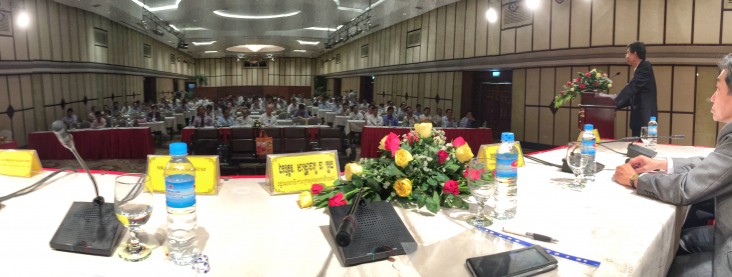
Your Excellency Professor Thir Kruy, Secretary of State, Ministry of Health
Your Excellency Professor Yith Sunnara, Under Secretary of State, Ministry of Health
Ms. Birgit Strube, First Secretary of the German Embassy
Distinguished guests and colleagues
I am happy to be here today to help conclude the Clinical Practice Guidelines Dissemination Workshop. USAID has proudly supported the Ministry of Health throughout the process of developing and implementing these guidelines. We view this initiative as an important part of our shared effort to improve the quality of medical care in Cambodia.
Clinical practice guidelines, or CPGs, as they are usually called, are an essential part of modern evidence-based medicine. It is hard to believe that it was only 25 years ago that CPGs began to have a significant influence in the medical community. The standard definition of a CPG is a “systematically developed statement to assist practitioners’ and patients’ decisions about appropriate health care for specific circumstances.”
What does this mean? Well, it mainly means that CPGs are designed to support the decision-making process in patient care while helping toensure the quality and consistency of that care. They do this by being based on the best evidence available. The content of a CPG is based on a systematic review of clinical evidence. Here in Cambodia this was done by teams of Cambodian experts organized and led by Undersecretary of State Yith Sunnara, himself working under the guidance of H.E. Professor Thir Kruy, Secretary of State in charge of improving the quality of care in Cambodia.
Over the past couple of decades, the movement towards evidence-based healthcare has been gaining ground all over the world. Just as in Cambodia, this has been motivated by clinicians, politicians, and health system managers concerned about the quality and the consistency of the care provided to patients. CPGs, based on standardized best practices, have been shown to be capable of supporting improvements in the quality and consistency of healthcare. Many have been developed in spite of a time- and resource-consuming process. Many have been disseminated, though largely in the relatively difficult to use format of narrative text. While CPGs have not yet had a major impact on medical practice around the world, no one can deny that their importance is growing. It is vital that Cambodia joins the movement to this form of evidence-based care.
In the hands of well-trained doctors, CPGs can help the Ministry of Health accomplish a number of desired goals:
- They describe appropriate care based on the best available scientific evidence and broad consensus;
- They reduce inappropriate variation in practice;
- They provide a more rational basis for referral;
- They provide a focus for continuing medical education;
- They promote a more efficient use of resources;
- They act as a focus for quality control.
The aim of clinical guidelines is to improve the quality of care by translating research findings into practice. But they do not do this automatically; how CPGs are written and presented factor into the probability of their success. The users and the type of facility they work in needs be taken into account when developing the CPGs. So the CPG for a specific condition should be different for a National Hospital as opposed to a CPA2 hospital. USAID looks forward to ongoing partnership with the Ministry to develop, share and use clinical pathways and job aids to further strengthen specific CPGs that are currently being disseminated. We want to ensure that they have maximum impact as part of a larger strategy to improve the quality of care in Cambodian hospitals.
When you look at the experience of CPGs worldwide the evidence shows serious problems in their actual adoption in practice. In other words, many doctors don’t use them. They are easier to write than to use. This is undoubtedly a problem that everyone in this room is going to face over the coming months. We need to work together to figure out a way to get the doctors of Cambodia to use the CPGs that you are taking back with you today.
The Cambodian MOH has shown an admirable commitment to improving the quality of health care delivered by Cambodian health providers. Patients rely on these providers – on you – for quality care. They expect that you and your colleagues have the knowledge and expertise to make the right clinical decisions. CPGs can help you do that for a particular disease or condition. While there always will be uncertainty in clinical practice, every patient presents their own complex set of issues. Ensuring doctors have good CPGs will bring more evidence to assist both clinicians and patients with decision-making. Trustworthy guidelines hold the promise of improving health care quality and outcomes. Let us hope that together we can accomplish this goal.
Thank you.
Related Speeches
- Remarks by Christina Lau, Deputy Director, Office of Public Health and Education, USAID/Cambodia, Opening Ceremony of the Kick-Off Workshop for “One Health Workforce”
- Remarks by Sheri-Nouane Duncan-Jones, Director, Office of Public Health and Education, USAID Cambodia, Dissemination Workshop on Integrated Behavioral and Biological Survey among Female Entertainment Workers in Cambodia in 2017
- Remarks by Mr. Noah Mathew Sprafkin, Maternal Child Health/Family Planning/Nutrition Team Leader, USAID Cambodia, Orientation Workshop on Regulations for Health Practitioners Law







Comment
Make a general inquiry or suggest an improvement.